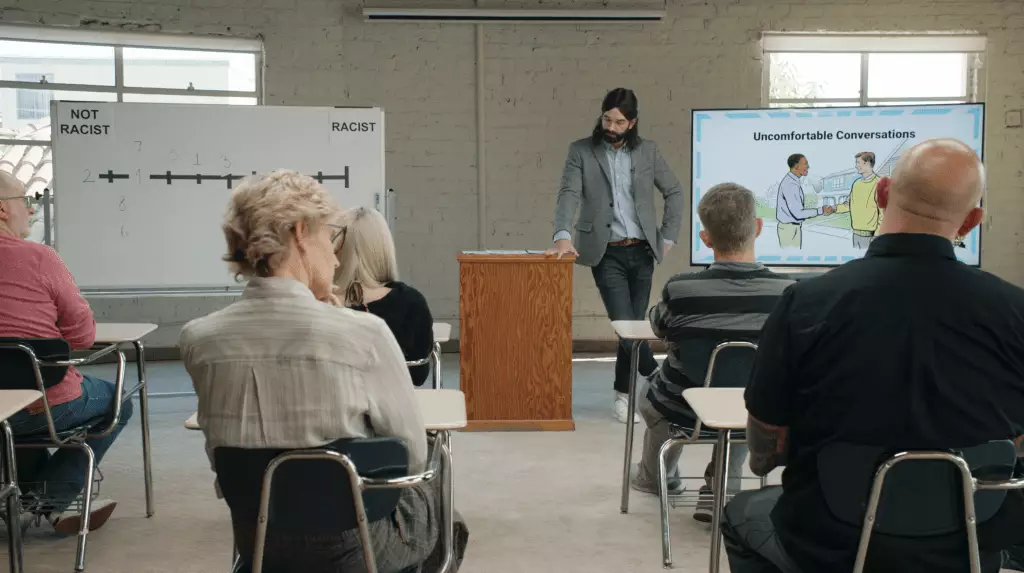In a notable weekend for the domestic box office, the emergence of conservative and faith-driven narratives has sparked conversations among filmmakers and audiences alike. Two films, one centered on the controversial topic of Diversity, Equity, and Inclusion (DEI) and another from the beloved “God’s Not Dead” franchise, have found their way into the top ten, revealing a unique trend in audience preferences that dances around cultural debates and cinematic expression.
“At Home One,” a documentary produced by Jeremy Boreing and Ben Shapiro’s The Daily Wire, opened with an impressive $4.75 million, ranking fourth domestically. This marks one of the most successful debuts for a documentary in a decade. The film’s premise is provocative, with a plot that follows host Matt Walsh’s satirical journey to obtain a DEI certificate. This narrative cleverly critiques the increasingly common practices of promoting diversity, equity, and inclusion within organizations—a topic that has faced backlash from conservative lawmakers eager to challenge prevailing social narratives.
Underscoring the film’s success is its audience rating, holding a remarkable 99% on Rotten Tomatoes with over 500 ratings. However, the absence of a critics’ score raises questions about the broader reception of the film within the academic and critical film community. It begs a closer examination—do audience scores alone quantify a film’s quality or its impact? The film’s demographic reach is telling, with a predominantly young audience (40% under the age of 35) showing strong interest, signifying a thirst for content that aligns with their values and prevailing social debates.
The faith-based sequel “God’s Not Dead: In God We Trust” paraded its own success with a $1.46 million weekend, further solidifying the series’ foothold in evangelical cinema. This fifth installment tackles themes central to conservative Christian activism: the intersection of faith and politics. The film features a cast that connects well with its audience, including David A.R. White and Isaiah Washington, enhancing its relatability and sincere message.
Yet, while the film enjoys a solid audience approval rate of 98% on Rotten Tomatoes, it too suffers from the absence of a critics’ consensus, leaving its artistic merit unexamined in the critical discourse. The repetitive motif of faith-themed films often prompts discussions about originality and depth—are audiences enjoying these films purely for their values, or could they be seeking more nuanced storytelling within this framework?
Meanwhile, the anime landscape has found an intriguing entry with “Dan Dan Dan: First Encounter,” which grossed over $1 million despite a limited release across 610 theaters. This strategic move highlights an evolving landscape where anime is not only surviving but thriving in the cinematic space. The film’s positive reception is enhanced by its exploration of popular motifs within anime, captivating audiences beyond typical genre delineations.
With a stellar 99% audience score, this anime presents a compelling case for broader acceptance of animated films in theaters alongside mainstream releases. It raises questions about audience expectations and the shifting perception of anime as a legitimate art form. As audiences embrace this medium, filmmakers must ask themselves how to balance artistic expression with commercial viability in a competitive landscape.
The weekend was not short on surprises, with “My Old Ass” from Amazon MGM Studios quietly making an impact despite a mere $171.2k opening in just seven theaters. The film’s per-screen average suggests potential for continued success as it rolls out to more theaters in upcoming weeks. Starring acclaimed actress Aubrey Plaza, this comedy offers wit and charm—qualities that have audiences flocking to theatres.
The burgeoning interest in limited-release films signifies a shift in consumer behavior, particularly among those who seek out unique narratives and character-driven plots. This decision to prioritize narrative strength over blockbuster spectacle speaks to a discerning audience that is hungry for genuine storytelling.
As we dissect the weekend’s box office dynamics, a recurring theme emerges: the intersection of ideology and entertainment is shaping audience preferences. Conservative narratives and faith-based themes are making unprecedented inroads at the box office, driven by a demographic eager for stories that resonate with their values. Meanwhile, the rise of diverse genres—including animation—highlights the need for adaptive strategies in an ever-evolving film landscape.
Ultimately, these cinematic experiences reflect a broader cultural conversation, urging filmmakers to thoughtfully consider how their stories can engage, challenge, and entertain. The landscape is ripe for exploration, and it is clear that audiences are ready for more. As the box office looks ahead, it is an exciting time to witness how these emerging trends will shape our collective storytelling landscape moving forward.

